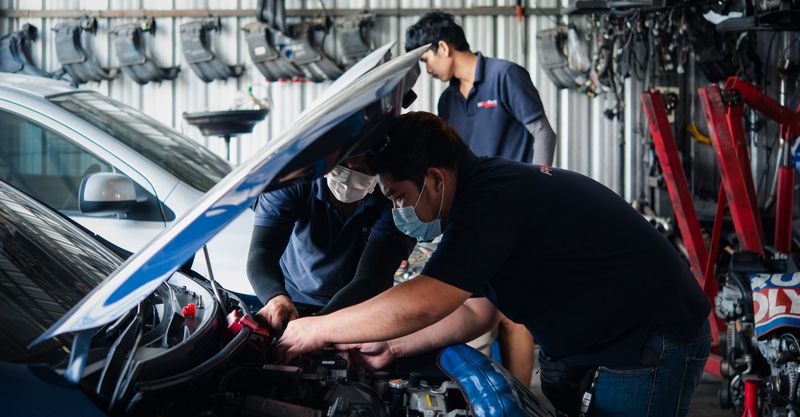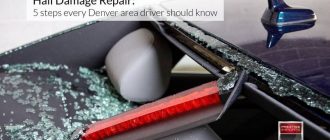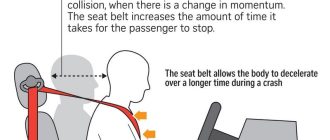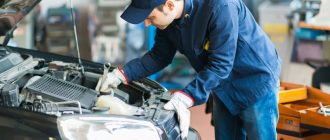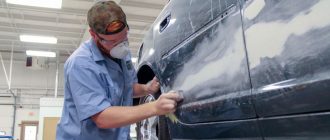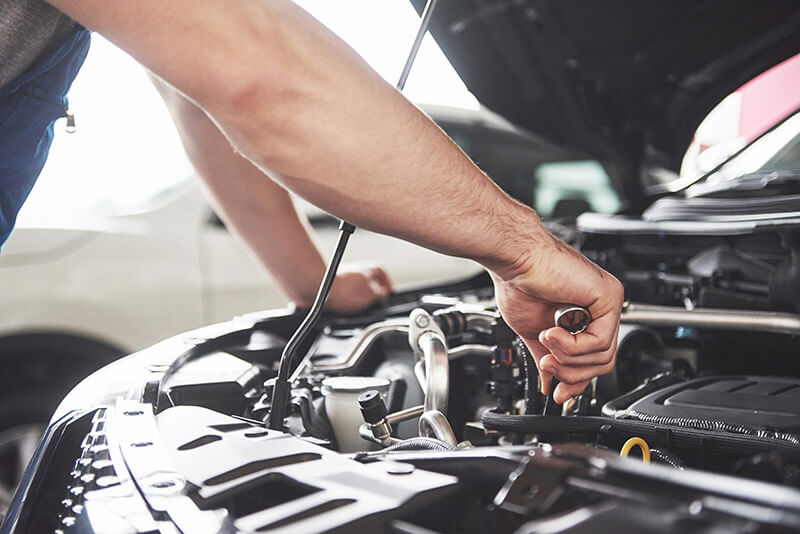
Is DIY Car Repair a Good Idea?
Doing it yourself (DIY) car repair is a hotly debated topic among car enthusiasts. Some argue that taking matters into your own hands is empowering and cost-effective, while others believe it’s a risky endeavor that should be left to professionals. So, is attempting to repair your car on your own a good idea?
On the one hand, DIY car repair can save you a significant amount of money. Hiring a professional mechanic can be expensive, especially if the repair is minor and something you could easily handle yourself. By learning how to fix basic issues, you can avoid paying for labor costs and potentially expensive parts. Additionally, working on your own car can be a rewarding experience, giving you a sense of accomplishment and control over your vehicle.
However, there are also several drawbacks to DIY car repair. One of the main concerns is the lack of expertise and experience that amateurs may have. Cars are complex machines, and attempting repairs without the proper knowledge and tools can lead to further damage and safety hazards. Making a mistake during a repair can be costly and even dangerous. It’s also worth considering that some repairs require specialized equipment that may not be readily available to DIY enthusiasts.
In conclusion, the decision to attempt DIY car repair is a personal one that should be weighed carefully. While it can save you money and provide a sense of accomplishment, it’s important to recognize the risks and limitations. If you have little to no experience with car repairs, it may be best to leave more complex issues to the professionals. As with any project, doing proper research and consulting with experts can help you determine if the DIY route is worth pursuing in your specific situation.
The Benefits and Drawbacks of Do-It-Yourself Car Repair: Evaluating the Value
When it comes to car repairs, many people wonder if attempting a do-it-yourself (DIY) approach is a good idea. DIY car repair is an option that allows car owners to save money and gain a sense of accomplishment by fixing their own vehicles. However, it is important to carefully consider the pros and cons before diving into a DIY repair project.
One of the main benefits of DIY car repair is the potential cost savings. By performing repairs yourself, you can avoid the labor costs associated with taking your car to a professional mechanic. Additionally, you have control over the parts and materials used, giving you the opportunity to choose more affordable options. This can result in significant savings, especially for minor repairs.
Furthermore, engaging in DIY car repair can be a rewarding experience. Successfully repairing your own car can boost your confidence and provide a sense of accomplishment. It allows you to learn new skills and gain a deeper understanding of your vehicle. This can be particularly beneficial for car enthusiasts or individuals who enjoy working with their hands.
Despite these benefits, it is important to recognize the drawbacks of DIY car repair. One significant drawback is the potential for mistakes or errors. Without proper knowledge and experience, attempting complex repairs can lead to further damage or safety risks. This can end up costing more in the long run and may even void warranties if not done correctly.
In addition, DIY car repair requires time and effort. Depending on your skill level and the complexity of the repair, it may take longer to fix your car yourself compared to taking it to a professional. This can be inconvenient, especially if you rely on your car for daily transportation.
It is also worth considering the availability of tools and equipment. Certain repairs may require specialized tools that you may not have access to. Purchasing these tools can add to the overall cost of the repair, potentially reducing the financial benefits of DIY car repair.
| Pros | Cons |
| Potential cost savings | Potential for mistakes or errors |
| Sense of accomplishment and learning | Time and effort required |
| Control over parts and materials used | Availability of specialized tools |
In conclusion, deciding whether DIY car repair is a good idea depends on your individual circumstances and skills. While it can save money and provide a sense of accomplishment, it also carries risks and requires time and effort. Evaluating the benefits and drawbacks can help you make an informed decision and determine if DIY car repair is worth it for you.
Cost-Effectiveness of DIY Car Repair
Repairing your own car can be a good idea when it comes to saving money. DIY car repair allows car owners to avoid high labor costs typically associated with professional repairs. By performing repairs yourself, you can purchase the necessary parts at a discounted rate and eliminate the need to pay for services you can provide on your own.
Furthermore, DIY car repair offers the opportunity to learn and develop new skills, which can extend beyond just fixing your car. You can gain knowledge and experience that can be applied to future repairs, potentially saving even more money in the long run.
However, it is important to note that the cost-effectiveness of DIY car repair will largely depend on your own skills and abilities. If you lack experience or knowledge in automotive repair, attempting complex repairs can lead to costly mistakes or even further damage to your car.
Before embarking on a DIY car repair project, consider the following:
1. Complexity of the Repair:
Assess whether the repair is within your skill level and comfort zone. Certain repairs, such as changing the oil or replacing a battery, are relatively simple and can be easily handled by most car owners. However, more complicated repairs, such as engine or transmission issues, may require professional expertise.
2. Availability of Tools and Equipment:
Take into account whether you have the necessary tools and equipment to complete the repair. Investing in specialized tools for one-time use may not be cost-effective unless you plan to frequently engage in DIY car repairs.
Overall, DIY car repair can be a cost-effective option for car owners who possess the skills and knowledge necessary to successfully complete a repair. However, it is important to assess the complexity of the repair and ensure you have the necessary tools before embarking on a DIY project.
Time and Convenience Considerations
One of the main factors to consider when deciding whether or not to DIY car repairs is the amount of time it will take to complete the job. While doing it yourself can save money on labor costs, it can also be a time-consuming process, especially if you don’t have experience or the necessary tools.
However, for those who enjoy working on cars or have a flexible schedule, DIY repairs can be a rewarding and educational experience. It allows you to have full control over the repair process and can give you a sense of satisfaction when the job is done.
On the other hand, if you lead a busy life or have limited time, taking your car to a professional repair shop may be a better option. Professional mechanics are trained and experienced in performing repairs efficiently, and they have all the tools and equipment needed to get the job done quickly and correctly.
Furthermore, DIY repairs can be risky if you’re not confident in your abilities or lack the knowledge required for the specific repair. Mistakes made during the repair process can result in further damage to your car or even pose a safety risk. In such cases, seeking professional help is a safer and more reliable choice.
- In summary, the idea of DIY car repairs is a good one if you have the time, knowledge, and necessary tools to complete the job efficiently and safely. It can save you money, allow you to learn new skills, and provide a sense of accomplishment.
- However, if you are pressed for time, lack the skills or confidence, or the repair is complex, it may be best to leave it to the professionals. They will have the expertise and resources to get the job done quickly and correctly, ensuring your vehicle is safe and reliable.
Learning Opportunities and Skill Development
Learning how to repair your own car is a good idea for several reasons. Firstly, it gives you the opportunity to gain a deeper understanding of how your car works and what may be causing any issues. By taking the time to research and learn about different car parts and systems, you can become more knowledgeable about your vehicle.
Additionally, DIY car repair allows you to develop valuable skills that can be applied to other areas of life. For example, troubleshooting and problem-solving are important skills that can be honed through working on cars. Being able to diagnose and fix issues on your own can not only save you money, but it also gives you a sense of accomplishment and self-sufficiency.
Furthermore, learning how to repair your own car can provide you with a sense of empowerment and independence. Instead of relying on a mechanic for every car problem, you can take matters into your own hands and fix the issue yourself. This can be especially useful in emergency situations or when you need a quick fix.
However, it is important to note that DIY car repair is not always the best option. Some car repairs require specialized knowledge and equipment that may be beyond the scope of a DIY repair. In such cases, it may be better to seek professional help to ensure the repair is done correctly and safely.
- Learning how to repair your own car can provide a good sense of accomplishment and self-sufficiency.
- DIY car repair allows you to develop valuable skills such as troubleshooting and problem-solving.
- Being able to fix your own car can save you money and give you a deeper understanding of your vehicle.
- However, some repairs may require professional help due to the need for specialized knowledge and equipment.
Potential Safety Risks Associated with DIY Car Repair
While attempting to repair your car on your own may seem like a good idea in terms of saving money and gaining a sense of accomplishment, it is important to consider the potential safety risks that DIY car repair can present. Without the proper knowledge, tools, and experience, attempting to fix your car yourself can result in serious accidents or injuries.
Here are some potential safety risks associated with DIY car repair:
| Inadequate Protection | DIY car repair often involves working with hazardous chemicals, heavy machinery, and sharp tools. Without proper protective gear such as gloves, safety glasses, and appropriate clothing, you put yourself at risk of chemical burns, eye injuries, and lacerations. |
| Electrical Hazards | Repairing electrical components in your car, such as the battery or wiring, requires knowledge and caution. Mishandling electrical systems can result in electric shocks, which can be fatal or cause serious injuries. |
| Improper Lifting and Support | When working under a car, improper lifting and support can lead to the vehicle falling, causing severe injuries or even death. It is essential to use the correct jack stands or ramps and follow proper safety procedures to ensure the car is securely lifted. |
| Inaccurate Diagnosis | Without the expertise of a professional, you may misdiagnose the problem with your car, leading to incorrect repairs. This can result in further damage to the vehicle or even pose a safety risk while driving, putting yourself and others in danger. |
| Complexity of Repairs | Some car repairs require specialized tools and knowledge that DIY enthusiasts may not possess. Attempting complex repairs without the right equipment can result in improper installation or further damage to the car, potentially compromising its safety on the road. |
It is important to weigh the potential safety risks associated with DIY car repair against the potential benefits. If you are unsure or inexperienced, it may be safer and more cost-effective to seek the assistance of a professional mechanic.
Quality and Reliability of DIY Car Repairs
When it comes to the idea of DIY car repair, one of the main concerns that people have is the quality and reliability of the repairs. After all, not everyone has the same level of expertise when it comes to working on cars, and a small mistake could potentially lead to bigger problems down the line.
While it is true that DIY car repairs can be a cost-effective way to fix minor issues and save money on labor costs, it is important to consider the potential risks involved. Without proper training and knowledge, there is a higher chance of making mistakes that could impact the overall quality and reliability of the repairs.
That being said, there are certain situations where DIY car repairs can be a good idea. For simple tasks such as changing a flat tire, replacing a battery, or changing the oil, the average person can easily follow step-by-step instructions and successfully complete the repair without any issues.
However, for more complex repairs such as engine or transmission problems, it is generally recommended to leave it to the professionals. These types of repairs require specialized tools and knowledge that the average DIYer may not have. Additionally, if a repair is not done correctly, it could lead to further damage and potentially cost even more to fix in the long run.
When considering the quality and reliability of DIY car repairs, it is important to assess your own skills and knowledge. If you have prior experience or have successfully completed similar repairs in the past, DIY car repairs may be a good option for you. On the other hand, if you are unsure or lack the necessary expertise, it is best to leave it to the professionals to ensure the highest level of quality and reliability.
In conclusion, while DIY car repairs can be a good idea in certain situations, it is important to consider the potential risks and evaluate your own abilities before attempting any repairs. By being honest with yourself and understanding your limitations, you can make an informed decision that will ultimately result in the best quality and reliability for your car repairs.
Availability of Resources and Tools
The accessibility of resources and tools is a major factor to consider when deciding whether DIY car repair is a good idea. If you have access to the necessary resources and tools, it can be a cost-effective and convenient way to fix your car issues.
With a wide range of instructional videos, online forums, and repair manuals available, it has never been easier to find information and guidance for DIY car repair. These resources can provide step-by-step instructions and troubleshooting tips for common car problems.
In addition to online resources, having the necessary tools is crucial for successful DIY car repair. Basic tools such as wrenches, socket sets, and multimeters are often required for various repairs. If you already have these tools or are willing to invest in them, DIY car repair becomes a viable option.
However, it’s important to consider the complexity of the repair before attempting it yourself. Some car repairs may require specialized tools or equipment that are not easily accessible. In these cases, it may be more cost-effective to seek professional help.
Furthermore, it’s important to note that certain car repairs may require specific knowledge or expertise. While resources and tools may be available, not everyone has the necessary skills to effectively perform complex repairs. In such cases, it is advisable to consult a professional mechanic to ensure the repair is done correctly and safely.
In conclusion, the availability of resources and tools is a crucial aspect to consider when deciding whether DIY car repair is a good idea. If you have access to the necessary resources, tools, and possess the required knowledge and skills, DIY car repair can be a cost-effective and convenient option. However, for complex repairs or situations where specialized tools or expertise are needed, seeking professional help is the wiser choice.
Warranty and Insurance Implications
When it comes to DIY car repair, one of the main concerns is the potential impact on the car’s warranty and insurance coverage. While there can be some benefits to doing repairs yourself, it’s important to consider the warranty and insurance implications before diving in.
Car warranties often come with specific requirements and conditions, including the use of authorized repair shops and certified technicians. By attempting DIY repairs, you run the risk of voiding your warranty if the repairs are not done correctly or if unauthorized parts are used. This can be a major downside, especially if your car is relatively new and still covered by a warranty.
Additionally, insurance companies may also have specific requirements for repairs. In the event of an accident or damage, they may require proof of professional repairs and may not fully cover any DIY repairs that you have done. This means that if you DIY repair your car and later need to make an insurance claim, you may be left with a significant out-of-pocket expense.
It’s also worth considering the expertise and knowledge required to properly diagnose and fix car issues. While some repairs may be straightforward and easily doable by an experienced DIYer, others may require specialized tools, equipment, and knowledge. Without the necessary expertise, you may end up causing further damage to your car or not fixing the issue properly, which can lead to more expensive repairs down the line.
In conclusion, while DIY car repair can be a good idea in certain situations, it’s important to carefully consider the warranty and insurance implications. Voiding your warranty or potentially not having full insurance coverage can outweigh the cost savings of DIY repairs. It’s always a good idea to weigh the pros and cons, consult with a professional if needed, and make an informed decision based on your specific situation.
Complex Repairs: When to Seek Professional Help
While DIY car repairs can be a good way to save money and learn new skills, there are certain complex repairs that are best left to professionals. When it comes to intricate and specialized tasks, seeking the help of a certified car repair technician is often the wisest choice.
Complex repairs can involve issues such as engine overhauls, transmission replacements, advanced electrical problems, and intricate brake repairs. These types of repairs require a deep understanding of the inner workings of a car and specialized tools that may not be readily available to the average DIY enthusiast.
Attempting to tackle a complex repair without the necessary knowledge and experience can lead to further damage to your car and potential safety hazards. It may also end up costing you more in the long run if you must have a professional fix any mistakes that were made during the DIY attempt.
Professional car repair technicians have spent years honing their skills and acquiring the knowledge needed to diagnose and fix complex issues. They have access to diagnostic equipment and specialized tools that allow them to efficiently and effectively repair your car.
Additionally, professional technicians often have access to manufacturer-specific training and information, which can be crucial for certain repairs. This specialized knowledge and expertise can ensure that your car is repaired correctly and is in optimal condition.
It’s important to know your limits when it comes to car repairs. While DIY repairs can be a rewarding and cost-effective option for many car maintenance tasks, knowing when to seek professional help is essential for the longevity and safety of your vehicle.
When faced with complex repairs, don’t hesitate to reach out to a professional car repair service. They have the skills, knowledge, and resources to handle the job efficiently and effectively, leaving you with peace of mind that your car is in good hands.
Community and Social Aspects of DIY Car Repair
Repairing a car yourself can be a daunting task, especially if you have little to no experience in automobile maintenance. However, the DIY car repair idea has gained popularity in recent years, with many individuals choosing to take on these projects themselves rather than relying on professional mechanics. This shift has created a vibrant and supportive community of DIY car enthusiasts.
One of the main benefits of engaging in DIY car repair is the opportunity to join a community of like-minded individuals who share a passion for cars and fixing things. Online forums and social media groups dedicated to DIY car repair provide a platform for people to connect, share knowledge, and ask for advice. This sense of community fosters a supportive environment where individuals can learn and grow together.
Furthermore, DIY car repair can be a social activity that brings people together. Friends and family members can come together to help each other with repairs, turning what might be a solitary task into an opportunity for bonding and collaboration. Not only does this build stronger relationships, but it also provides a chance to learn from one another and develop new skills.
Additionally, engaging in DIY car repair can also have positive community-wide impacts. By choosing to repair your car yourself, you can reduce your reliance on professional services, which can help to stimulate local economies. Moreover, DIY car repair can lead to cost savings, allowing individuals to allocate their resources towards other important aspects of their lives.
While there may be potential risks and drawbacks to DIY car repair, such as the risk of making costly mistakes or not having access to specialized tools, the sense of community and social connections that come with it are valuable benefits. DIY car repair allows individuals to connect with others who share their passion, learn new skills, and contribute to their local communities.
Questions and answers:
Is it cheaper to do car repairs yourself?
Yes, doing car repairs yourself can be cheaper than taking your car to a professional mechanic. Repair shops charge labor costs on top of the cost of parts, whereas if you do the repairs yourself, you only have to pay for the parts.
What are the risks of doing DIY car repairs?
One of the risks of doing DIY car repairs is that you may not have the necessary skills and knowledge to properly fix the problem. This can lead to further damage to your car or even potential safety hazards. Additionally, if you make a mistake, it could void any warranties you have on your vehicle.
Are there any benefits to doing DIY car repairs?
Yes, there are benefits to doing DIY car repairs. Firstly, you can save money by not paying for labor costs. Additionally, it can be a rewarding experience to learn new skills and take ownership of maintaining your own vehicle. It also allows you to have more control over the quality of the parts and materials used.
What types of car repairs are suitable for DIY?
There are certain car repairs that are more suitable for DIY, such as changing the oil, replacing air filters, changing spark plugs, and replacing brake pads. These repairs are relatively simple and can be done with basic tools. However, more complex repairs, such as engine or transmission repairs, may require specialized tools and knowledge, and are best left to professionals.
Should I consider my skill level when deciding to do DIY car repairs?
Yes, it is important to consider your skill level when deciding to do DIY car repairs. If you have little to no experience or knowledge about car repairs, it may be best to leave the repairs to a professional who can ensure the job is done correctly and safely. However, if you have some knowledge and feel confident in your abilities, you can attempt simpler repairs on your own.
What are the advantages of DIY car repair?
DIY car repair can save you money because you won’t have to pay for labor costs. It also allows you to have more control over the repairs and make sure they are done correctly. Additionally, it can be a rewarding and educational experience, as you will learn more about how your car works and gain new skills.
